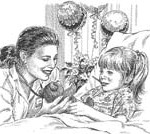 My mother is a retired nurse. Thus, when my siblings and I were growing up, the usual aches and pains of childhood got very little attention unless they were really serious, and episodes of playground trauma were met with abbreviated sympathy, the occasional band-aid, and instructions to go back and play. Because of my mother’s medical knowledge, we were unable to milk certain situations. Although we sometimes got to stay home from school for true illness, it was hard to fake being sick with my mom. Other than those episodes of ear infections and the occasional strep throat, we rarely went to the doctor except for check-ups and significant head trauma requiring stitches.
My mother is a retired nurse. Thus, when my siblings and I were growing up, the usual aches and pains of childhood got very little attention unless they were really serious, and episodes of playground trauma were met with abbreviated sympathy, the occasional band-aid, and instructions to go back and play. Because of my mother’s medical knowledge, we were unable to milk certain situations. Although we sometimes got to stay home from school for true illness, it was hard to fake being sick with my mom. Other than those episodes of ear infections and the occasional strep throat, we rarely went to the doctor except for check-ups and significant head trauma requiring stitches.
In part because of her medical background and in part because she was of a different generation, my mother did not constantly call the doctor for parenting advice, as many of my patients do today. If we didn’t eat what she cooked for dinner, we might have been a little hungry going to sleep, but we ate what was on our plate the following night, because we understood that there would be no alternative option. If we were giving her a hard time going to bed, she closed the door. If we were mouthing off to her, she banished us to our rooms. There was no calling the doctor in distress because someone was a picky eater, or was having a temper tantrum, or was misbehaving at school. She just dealt with it. She understood that parenting involves taking unpopular positions with your children, and she didn’t care when we thought she was being mean. She reserved her calls to the doctor for real emergencies, and unless there was one, she would never think to bother him on a Sunday night with something that could wait until the next day, or even the next week. She understood that every problem didn’t need to be solved immediately. Though like all mothers she made some mistakes, she trusted her instincts, figured it out along the way, and did the best she could, which in the end was good enough.
Perhaps because she was a nurse, but more likely simply because she was a mother, my mom doled out health advice to us on a regular basis: “You need to get more sleep”, “Eat your vegetables”, “Don’t slouch”, “Go outside and get some fresh air”. Even now, she does this with her grown children. “You don’t get enough sleep”, “Stand up straight”. I roll my eyes like any good adolescent daughter, mildly resentful that my mother is still trying to tell me what to do. Sometimes, the snippy teenage girl that resides deep within me decides to cop an attitude, telling her that I actually know what I’m doing, mom, I went to medical school, remember? And like in the old days, she gives it right back to me, putting me in my place: “I don’t care what you or the American Academy of Pediatrics says, I raised four kids, and I know what I’m talking about.”
Interestingly, as I muddle through my days now as a parent and as a pediatrician, doling out advice to my own kids and my patients (both children and their parents), I find myself repeating a lot of the things my mother told me to do: eat your vegetables, go outside and play, get more sleep. Like my mom, I’m OK with the fact that my kids think I’m mean, and I do my best to convince parents who call me with limit-setting woes that sometimes you need to take unpopular positions with your kids, and that being a good mother occasionally requires being a mean mother. I make some mistakes, but I try to trust my instincts, figure it out along the way, and do the best I can.
So here I am, no longer a child, but still a daughter. I am now a middle-aged doctor and a mom myself, with a good many years of training and experience under my belt. But I’m still trying to remember to do what my mother told me to do. I’m also now telling my own kids and my patients to do what she said. So I guess I’ve come full circle. I’m not sure I’ll ever admit this to her, but I guess my mother was right.
